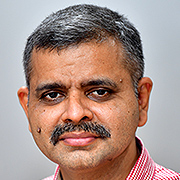Organ mafia thrives as police report gathers dust

Mail This Article
Kottayam: Forensic surgeon Dr Hitesh Shankar was stunned to see a breastfeeding mother coming forward to donate one of her kidneys. She had her baby in her arms. "Will you take care of the child if something happens to the mother," the doctor asked her husband. "Nothing will happen if one kidney is donated," he replied nonchalantly.
The man, however, was not willing to be a donor since, as he told the doctor, "I can't work if I donate a kidney". Dr Shankar, then an Associate Professor of the Department of Forensic Medicine, Thrissur Medical College, was a member of the Kidney Sub-Committee of the State Organ and Tissue Transplant Organisation. He opposed permitting the woman to donate her kidney.
The doctor objected to the plan since he suspected the woman's credentials, and her health condition. However, the government representative insisted on giving the nod, since it was a 'VIP case' and the higher-ups had instructed to approve the move. "I told the committee that the permission could not be granted that I would record my disapproval," Dr Shankar said. The committee relented. However, Dr Shankar did not attend the next meeting, and the committee approved the donation.
The 2012 incident that Dr Shankar narrated reflected the Thrissur-based organ mafia's clout. Following the incident, the committee submitted a report to the police, recommending a detailed probe. The police special branch conducted an investigation and submitted a 30-page report. The report never saw the light of the day. The Thrissur mafia's growth began with this incident.
Mafia's firm grip
Dr Shankar could not attend more meetings after he initiated action against the organ mafia. He is currently the head of the Department of Forensic Medicine at Manjeri Government Medical College Hospital. "The expert committee approves organ donation," he said. "The panel's meeting goes for an average of three hours, and within this time it considers 24 to 26 applications. Could it properly examine at least one application," the doctor asked.

Dr Shankar said that after he pointed out the anomaly to the health department, the number of applications was capped at 15. The forensic expert narrated another incident to underscore the impunity with which the mafia functions. Recently, a senior doctor with the health department wanted a kidney for one of his relatives.
The transplantation was to be conducted in a private hospital. Once the doctor came out of the hospital after an initial discussion, the kingpin of the mafia approached him. "You might be a big shot, but no kidney donation will be made here without my knowledge," he reportedly told the doctor. Later, donation went through with the knowledge of the mafia, Dr Shankar said.
Wives of alcoholics in crosshairs
A broker who arranges the organ has 'Kidney' prefixed to his name. The name was given to him by the local residents, and the 'fixer' considered it to be an honour. The mafia normally targets families of alcoholics. The middlemen convince the alcoholics and force their wives donate kidneys. Most families would be in debt and the mafia exploits the situation. The mafia would claim up to Rs 6 lakh from the recipient, but the woman donor would get only up to Rs 2 lakh. The lactating mother that Dr Shankar initially stopped, was given Rs 50,000. The police later intervened and made the broker pay her more.
The mafia has been finding kidney donors from villages adjoining the Thrissur city. The police have found that the mafia even trafficked people abroad after implicating them in false cases, and procuring passports. Most donors were aged below 30 years, and the recipients would be 70 or 80 years old. Dr Shankar said the government was alerted of such instances. As many as 12 suspicious cases, too, were reported. No action was taken on the special branch report, the surgeon added.


